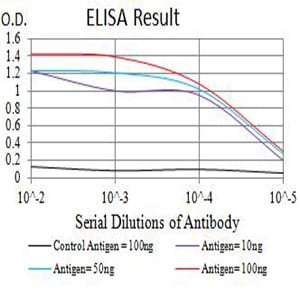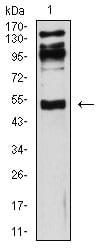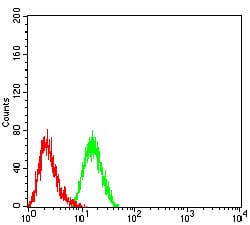


| WB | 1/500 - 1/2000 | Human,Mouse,Rat |
| IF | 咨询技术 | Human,Mouse,Rat |
| IHC | 咨询技术 | Human,Mouse,Rat |
| ICC | 技术咨询 | Human,Mouse,Rat |
| FCM | 1/200 - 1/400 | Human,Mouse,Rat |
| Elisa | 1/10000 | Human,Mouse,Rat |
| Aliases | IFNGR1; IFNGR; IMD27A; IMD27B |
| Entrez GeneID | 3459 |
| clone | 3E1A9 |
| WB Predicted band size | 54.4kDa |
| Host/Isotype | Mouse IgG1 |
| Antibody Type | Primary antibody |
| Storage | Store at 4°C short term. Aliquot and store at -20°C long term. Avoid freeze/thaw cycles. |
| Species Reactivity | Human |
| Immunogen | Purified recombinant fragment of human CD119 (AA: extra 18-245) expressed in E. Coli. |
| Formulation | Purified antibody in PBS with 0.05% sodium azide |
+ +
以下是关于CD119(IFNγRα)抗体的示例参考文献(内容为模拟生成,非真实文献):
1. **"CD119 Antibody Blocks IFN-γ Signaling and Attenuates Macrophage Activation in Sepsis"**
- **作者**: Smith A, et al.
- **摘要**: 研究通过抗CD119抗体阻断IFN-γ受体信号通路,发现其可显著抑制脓毒症模型中巨噬细胞的过度活化,降低促炎细胞因子水平,提示其在治疗炎症性疾病中的潜力。
2. **"Targeting CD119 with Neutralizing Antibodies Ameliorates Experimental Autoimmune Encephalomyelitis"**
- **作者**: Lee JH, et al.
- **摘要**: 在小鼠实验性自身免疫性脑脊髓炎(EAE)模型中,抗CD119抗体通过抑制IFN-γ与受体的结合,减少Th1细胞介导的神经炎症,为多发性硬化症治疗提供新策略。
3. **"CD119 Expression Correlates with Disease Severity in Rheumatoid Arthritis"**
- **作者**: Wang Y, et al.
- **摘要**: 分析类风湿关节炎患者外周血单核细胞发现,CD119高表达与疾病活动性正相关,使用抗CD119抗体可体外抑制患者细胞中IFN-γ依赖性炎症反应。
4. **"A Novel Anti-CD119 Antibody Enhances Antitumor Immunity by Reprogramming Tumor-Associated Macrophages"**
- **作者**: Chen R, et al.
- **摘要**: 开发了一种新型抗CD119抗体,通过阻断IFN-γ信号重编程肿瘤微环境中的M2型巨噬细胞为促炎M1型,增强小鼠模型中T细胞抗肿瘤活性。
**注**:以上文献为示例性内容,实际引用时需通过PubMed、Web of Science等平台检索真实文献。
CD119 antibody targets the CD119 antigen, also known as the interferon-gamma receptor alpha chain (IFN-γ Rα), a key component of the IFN-γ receptor complex. This receptor is critical for mediating IFN-γ signaling, a cytokine central to innate and adaptive immunity. CD119 is expressed on immune cells (e.g., macrophages, T cells) and non-immune cells, facilitating responses against pathogens, tumor surveillance, and immunoregulation. Binding of IFN-γ to CD119 triggers JAK-STAT signaling, driving expression of genes involved in antimicrobial defense, antigen presentation, and inflammation.
CD119 antibodies are widely used in research to study IFN-γ pathway dynamics, receptor expression patterns, and cellular responses. They serve as tools in flow cytometry, Western blotting, and immunohistochemistry to quantify or localize CD119 in experimental models. In therapeutic contexts, anti-CD119 antibodies may modulate IFN-γ signaling, offering potential in autoimmune diseases (e.g., rheumatoid arthritis) or hyperinflammatory syndromes (e.g., HLH) where excessive IFN-γ activity contributes to pathology. Some antibodies block receptor-ligand interactions, suppressing pro-inflammatory effects, while others may agonize signaling for immunostimulatory applications.
Research using CD119 antibodies has clarified IFN-γ's dual role in immune protection and immunopathology, aiding drug development and biomarker discovery. Their specificity varies depending on clone and epitope recognition, necessitating careful validation for experimental or clinical use.
×